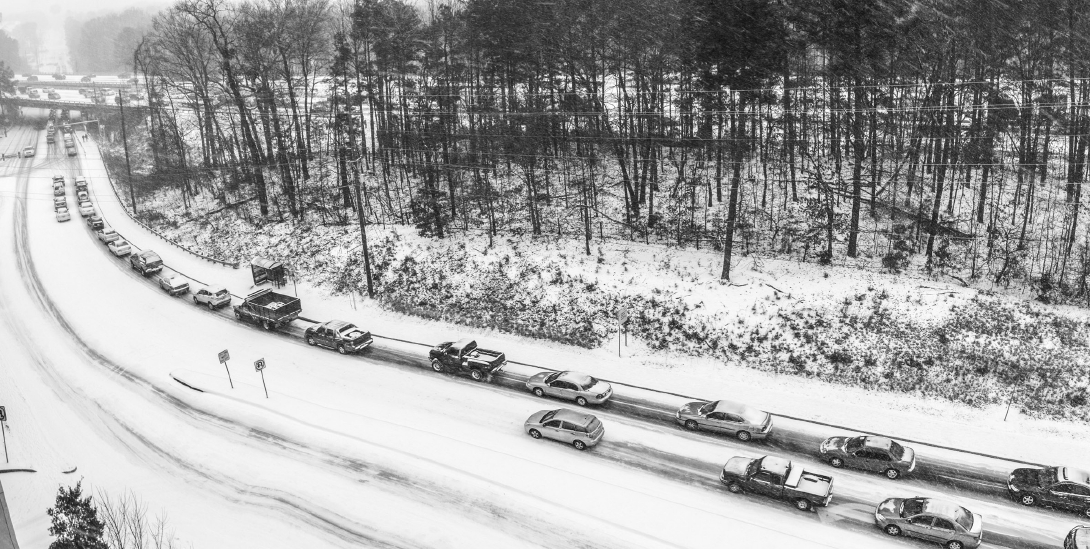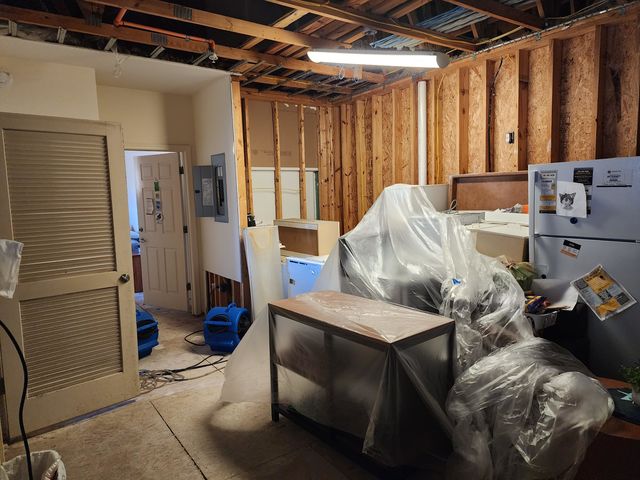
A two-day snow storm bringing two to four inches ravages the southeast shutting down most city and urban operations. Throughout Georgia, schools, businesses and major roads were closed down due to dangerous traveling conditions. On Tuesday afternoon the executive decision was made by the Atlanta city government to have everyone evacuate their schools and places of business and immediately return home. The entire city evacuating all at once caused snarling traffic jams on every road leading to car wrecks, citizens abandoning their cars and extended commutes home.
“I think the mayor did what he thought was best for Atlanta.” said freshman communication major Jacob Wells, “He didn’t sit there and say ‘what can I do to make a really big traffic jam?’ No, he did what he thought would be best for everyone. It just ended up being a disaster.”
Other citizens however were not as sympathetic.
“Of course it was a terrible idea. We weren’t prepared for such a disaster either….at least a few countermeasures like rock salt and chains for government vehicles would have helped the situation as opposed to literally nothing,” says junior psychology major Steven Moore.
Others like Samantha Raymond, sophomore psychology/ chemistry major, agree and believe the decision to evacuate was made too late.
“It would have been better for them to have been overly cautious…If they had looked ahead and made the decision early and not have been so afraid of being wrong; things would’ve turned out way better.”
In a response to the severity of the storm Mayor Kasim Reed stated that they “do take responsibility for having the business community, the government and our schools basically leave all at once.” Reed requested that everyone remain in their homes and off of the streets until they could get the city cleaned up. When asked how he would rate the city of Atlanta’s handling of the mayhem Reed stated he was only concerned with getting citizens safely back to their homes.
Whether or not Atlanta was asleep at the wheel with the snow storm does not change the fact that it blindsided the city and its population. Everyone was inconvenienced in some way by the surprise flurry.
Sophomore biology major Nathanael Leman endured a ten hour commute home after leaving Kennesaw State’s campus at 1 p.m. “I left KSU as soon as I could, but there was no avoiding the traffic,” said Leman. “I watched people spin out and crash the whole way home.”
Others like junior biology major Blake Dahler braved the cold on foot.
“I left Kennesaw at 12:30 p.m. and it took me half an hour to leave the parking decks,” said Dahler. “I live 10 minutes from Kennesaw and it took me eight hours to get home. I ended up getting in a friend’s car, but we ran out of gas and we walked five and a half miles in the snow to get home.”
Later that day Governor Nathan Deal declared a state of emergency for the state of Georgia that would extend through Sunday night. According to the L.A. Times, the Georgia state police logged over 1,400 car accidents and National Guard troops were dispatched to rescue stranded students and deliver food to stranded motorists spending the night in their cars along the highway.
The Georgia Emergency Management Agency had been questioned about the preparedness for the storm nearly 24 hours before it hit, according to the Atlanta Journal Constitution. Charley English, the director of the GEMA, admits fault for the lack of preparedness in Atlanta. Between English and Deal, the emergency plans seemed to simply slip through the cracks.
All throughout Atlanta people could be found sleeping in cars and even businesses. Stranded motorists spent the night in places like Publix, CVS and even Waffle House. Many businesses, including Maddio’s Pizza and Dunkin Donuts, remained open for people who were stuck and had no food. Numerous public schools kept students overnight because buses could not proceed safely on the icy roads and parents could not make it through the traffic to pick up their children.
While Atlanta remained at a standstill for two days, it’s citizens banded together to brave the winter storm. There was a Facebook page started called “SnowedOutAtlanta” on which people from all over posted tips on which businesses were open, where people could sleep, and what traffic looked like. People offered their homes for stranded travelers to sleep and get warm. Business and churches provided free food and shelter for the public.
In the wake of what is now referred to as “Winter Storm Leon,” metro Atlanta is now back on track. Most highways and major roads have been cleared, children have been returned home from their schools, people have trekked back to their abandoned cars, and businesses have reopened their doors. Most school systems, including KSU, will resume normal operations beginning Saturday Feb. 1.



